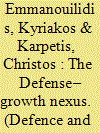| Srl | Item |
| 1 |
ID:
187355


|
|
|
|
|
| Summary/Abstract |
Until today, the great majority of the relevant literature is dominated by growth models that assume common structural parameters and Total Factor Productivity (TFP) evolution across countries. In the context of the modified Solow convergence equation, the role of the present paper is to highlight the importance of incorporating cross–country differences, both in observables and unobservables, in the investigation of the defense–growth nexus. Special attention is paid to the heterogeneity in TFP growth and the cross–country dependence induced by global shocks. Furthermore, it analyzes the econometric issues involved by providing a brief review of various heterogeneous dynamic panel estimators. The presented estimators are then applied to two alternative panel specifications of the Solow model. Overall, the empirical application revealed that the Dynamic Common Correlated Effects (DCCE) estimator seems to be the most reliable option among the various dynamic panel estimators employed.
|
|
|
|
|
|
|
|
|
|
|
|
|
|
|
|
| 2 |
ID:
171018


|
|
|
|
|
| Summary/Abstract |
A great part of the defense literature is focused on the interaction between military spending and economic activity. To investigate this interrelationship, researchers have applied a wide variety of methodologies with totally different assumptions and statistical properties. Until today, however, no detailed examination of the sensitivity of empirical results to the various statistical methods has been provided in the literature. The present paper attempts to fill this gap by providing, firstly, a review of the majority of the time series methodologies used in the defense–growth literature and, secondly, an econometric application using data of the U.S. economy over the period 1961–2015 in order to establish empirically the association between econometric procedures and empirical results. The empirical findings of the conducted analysis suggest that statistical methods can indeed become a significant source of variation in the investigation of the defense–growth nexus.
|
|
|
|
|
|
|
|
|
|
|
|
|
|
|
|